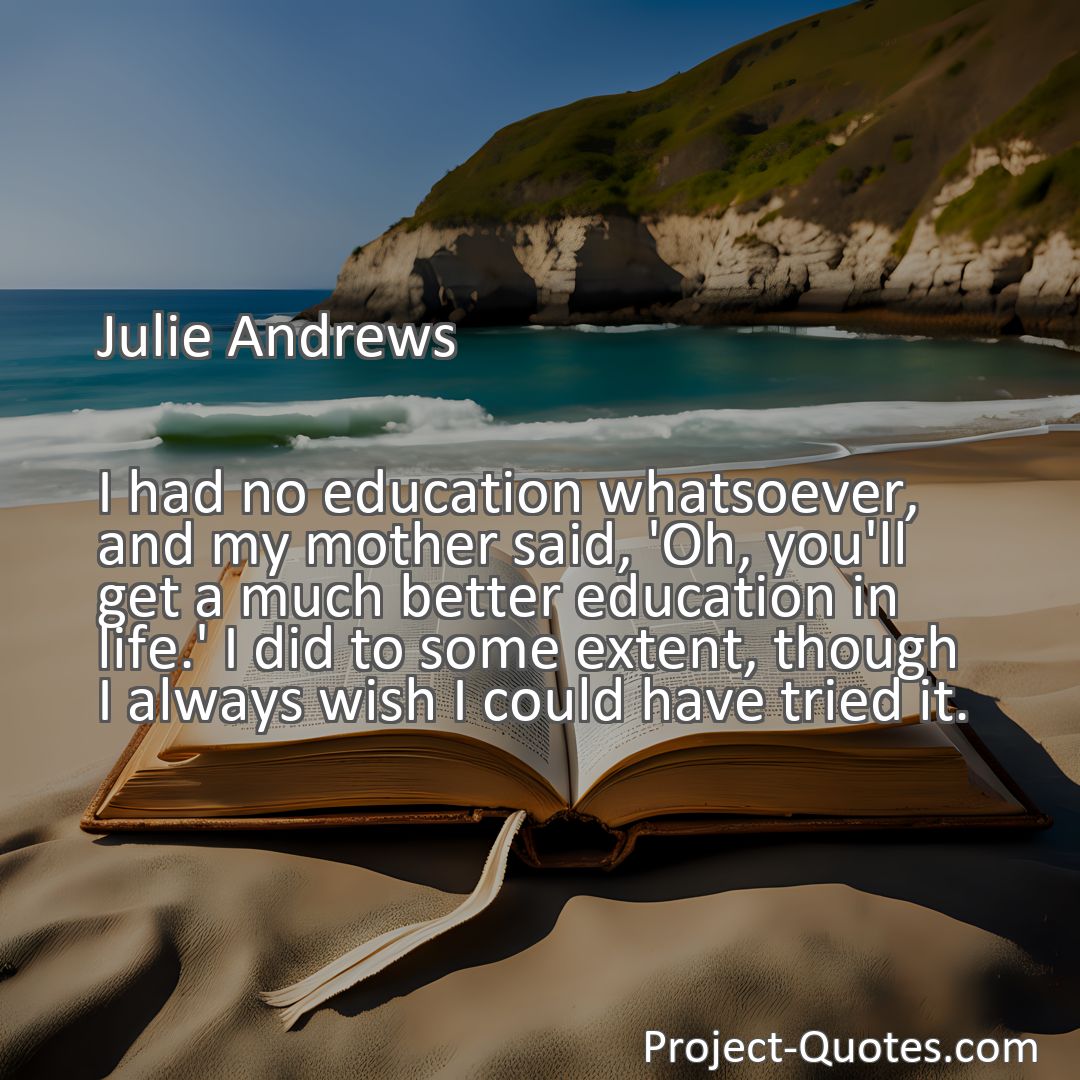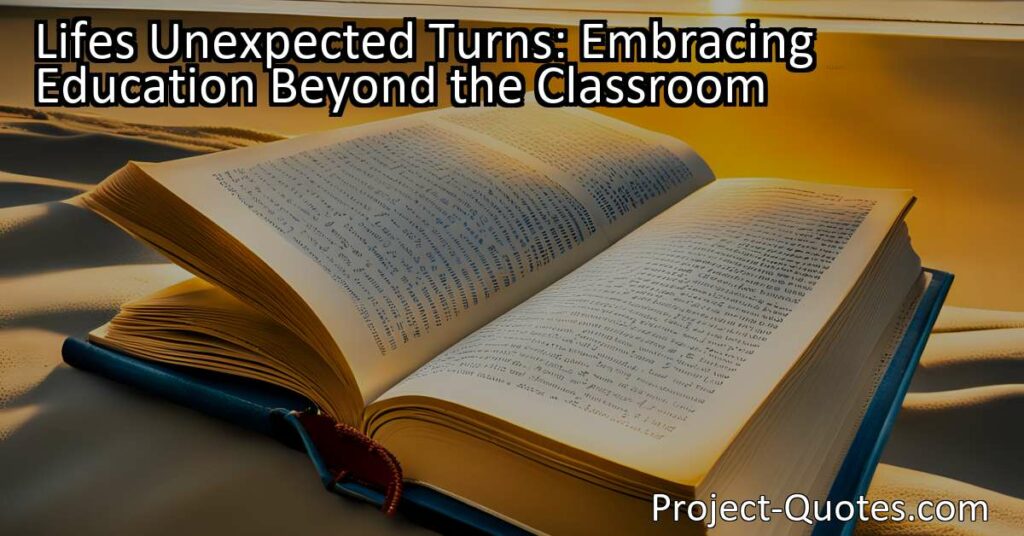I had no education whatsoever, and my mother said, ‘Oh, you’ll get a much better education in life.’ I did to some extent, though I always wish I could have tried it.
Julie Andrews
Life’s Unexpected Turns: Embracing Education Beyond the Classroom Julie Andrews, a celebrated actress and singer, shares her belief that education can be gained outside of the classroom. She reflects on her own upbringing and how life’s unexpected turns can provide valuable lessons and experiences that shape our understanding of the world.
Table of Contents
- 1 I had no education whatsoever, and my mother said, ‘Oh, you’ll get a much better education in life.’ I did to some extent, though I always wish I could have tried it.
- 2 Julie Andrews
- 3 Meaning of Quote – I had no education whatsoever, and my mother said, ‘Oh, you’ll get a much better education in life.’ I did to some extent, though I always wish I could have tried it.
- 4 Freely Shareable Quote Image
- 5 Related
Meaning of Quote – I had no education whatsoever, and my mother said, ‘Oh, you’ll get a much better education in life.’ I did to some extent, though I always wish I could have tried it.
Education is often seen as the key to success, but sometimes life takes unexpected turns and opportunities for formal education may not be readily available. Julie Andrews, a celebrated actress and singer, reflects on her own upbringing and shares her mother’s belief that education can be gained outside the classroom. In her quote, Andrews suggests that while she may not have had a traditional education, life itself has provided her with valuable lessons and experiences.
Andrews begins by acknowledging that she had no education whatsoever. This statement can be seen as a reflection of her early life, where opportunities for formal schooling were limited. However, instead of dwelling on the absence of a traditional education, she recounts her mother’s response to her situation. Her mother’s belief that “you’ll get a much better education in life” is a testament to the idea that knowledge can be gained through various avenues beyond the confines of a classroom.
It is no secret that formal education provides a structured environment for learning and obtaining knowledge. However, Andrews implies that life itself can serve as an excellent teacher. She states that she did, to some extent, receive an education through her life experiences. This suggests that Andrews recognizes the valuable lessons she has learned along her journey and the knowledge she has acquired outside of traditional educational institutions.
Life is full of opportunities to learn and grow, and often these opportunities are not confined to a specific curriculum or syllabus. In fact, some of the most valuable lessons come from personal experiences, interactions with others, and self-discovery. These lessons may not be found in textbooks, but rather through hands-on experiences and observation. Whether it’s traveling to different places, volunteering for a cause, or pursuing personal passions, these experiences can broaden one’s horizons and impart knowledge that cannot be learned solely through textbooks.
Andrews’ quote also suggests a sense of longing and curiosity about what a formal education might have offered her. She admits that she always wishes she could have tried it. This acknowledgment highlights the value of formal education and the opportunities it can provide. While she may have found education in life, there is a part of her that wonders what she might have learned in a more structured and traditional setting. This sentiment emphasizes the importance of education and the desire for knowledge that many individuals share, even if circumstances prevent them from pursuing it in the conventional way.
However, it is crucial to note that not having a formal education does not diminish a person’s ability to succeed or acquire knowledge. There are countless examples throughout history and in contemporary society of individuals who have achieved remarkable feats without a conventional education. From entrepreneurs to artists, innovators to activists, their successes have been shaped by their life experiences, perseverance, and passion.
Nonetheless, access to education should never be limited solely to classroom walls. It is essential to recognize that education should be inclusive and adaptable to different circumstances. For those who may not have access to formal schooling, alternative pathways to education need to be cultivated and celebrated. Lifelong learning, vocational training, mentorship, and self-guided study are all valuable means of acquiring knowledge and skills. They offer opportunities for individuals to broaden their horizons and pursue their passions while equipping themselves for success in various aspects of life.
In today’s rapidly changing world, where information is readily available at our fingertips, education goes beyond memorization and regurgitating facts. It encompasses critical thinking, problem-solving skills, adaptability, and a desire for lifelong learning. These skills can be honed and cultivated through a variety of experiences, both inside and outside the classroom.
Julie Andrews’ quote serves as a reminder that education is not solely confined to formal institutions. Life itself can be an excellent teacher, offering invaluable lessons and experiences that shape us as individuals. While formal education may provide structure and specialized knowledge in specific fields, it is the combination of academic and life education that ultimately creates well-rounded individuals.
In conclusion, Julie Andrews’ quote highlights the idea that education is not limited to traditional classroom settings. It reminds us that while formal education provides valuable knowledge, life itself can offer unique experiences and lessons that shape our understanding of the world. Embracing opportunities for lifelong learning, whether through traditional education or through personal experiences, allows individuals to continuously grow and evolve.
I hope this quote inspired image brings you hope and peace. Share it with someone who needs it today!


